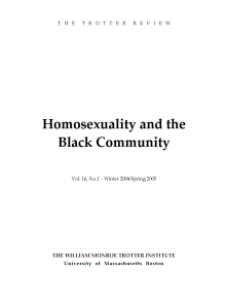Volume 16, Issue 1 (2004) Homosexuality and the Black Community
In addition to reporting research and providing analysis, The Trotter Review has always been a forum for presenting a range of perspectives on timely public issues in the Black community. In the fall of 2003 the Institute staff discussed the possibility of publishing a special issue of the Review devoted to exploring the topic of “homosexuality and the Black community.”
We were aware that there had been longstanding disagreements among Blacks about this issue. Anecdotal information suggested that:
- Black church leaders were generally hostile to homosexuals;
- Black homosexuals were frequently alienated, both from the Black community and the gay community;
- Black homosexuals were being blamed for the scourge of HIV/AIDS; and,
- Black men on the “down low” were accused of being the cause of the increasing number of Black women contracting HIV/AIDS. We considered this topic worthy of attention, but we had other priorities at the time.
Later, in the spring of 2004, the Supreme Judicial Court (SJC) of Massachusetts stunned the state and the nation by ruling that the state constitution permitted “gay marriage.” Specifically, the court ruled that it was unconstitutional to deny a couple of the same sex the right to be legally married. The jubilation in the gay/lesbian/bisexual/transgender (GLBT) community and the firestorm of indignant protest that followed this unprecedented decision were all that might have been expected. The GLBT community saw freedom and justice on the horizon. Opponents saw a threat to marriage as a sacred rite, to the institution of marriage, and to universal moral values. It was said that one battle in the “culture wars” had been waged but that the war itself was far from over. How strong could the negative reactions be? A conservative friend remarked to me after the 2004 presidential election that the outcome had been determined by the three g’s: “gays, guns, and God.” Whether one accepts in whole this flip analysis, it is clear that “gay marriage” was an issue for a segment of the electorate. At any rate, polls showed that the country was split on this issue.
The split in response existed in the Black community in Boston as well. Many Black church leaders lined up to express their disapproval. Some Black community leaders, academics, and supporters of GLBT rights were equally vocal. When the state legislature took up the issue in hearings, in floor debate, and in a constitutional convention, it was clear that the Black community was not of one mind.
That brings us to what we offer here. We wanted to have a balanced set of papers representing all perspectives in the Black community. In the end, I believe that a wide range of perspectives are represented, but balance cannot be claimed. It was not difficult to recruit individuals eager to express support for equal rights for the GLBT community and gay marriage. It was more difficult to obtain either papers or interviews from those we approached who had made public knowledge of their opposition.
From the Introduction by Castellano Turner.
Front Matter
Articles
Introduction
Castellano Turner
Gay Marriage and the Black Community, a Policy Maker’s Perspective: Interview with State Senator Dianne Wilkerson
Castellano Turner
Homosexuality and the Black Community, a Church Minister’s Perspective: Interview with Rev. Irene Monroe
Anne W. Gathuo
Homosexuality and the Black Community, a Church Minister’s Perspective: Interview with Rev. Richard Richardson
Castellano Turner
Homosexual and Racial Identity Conflicts and Depression Among African‐American Gay Males
William H. Alexander
Book Reviews
Sorting It All Out: Book Review of Delroy Constantine‐Simms’s The Greatest Taboo: Homosexuality in Black Communities
Anne W. Gathuo
The “Who,“ “What,” “Where” and “How” of the “Down Low”: A Personally‐Inspired Book Review of Keith Boykin’s Beyond the Down Low: Sex, Lies and Denial in Black America
William H. Alexander
Back Matter



